Medsurg iii - Study guides, Class notes & Summaries
Looking for the best study guides, study notes and summaries about Medsurg iii? On this page you'll find 107 study documents about Medsurg iii.
Page 2 out of 107 results
Sort by
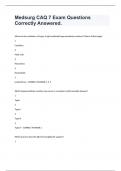
-
Medsurg CAQ 7 Exam Questions Correctly Answered.
- Exam (elaborations) • 69 pages • 2024
- Available in package deal
-
- $15.49
- + learn more
Medsurg CAQ 7 Exam Questions Correctly Answered. What are the mediators of injury in IgE-mediated hypersensitivity reactions? Select all that apply. 1 Cytokines 2 Mast cells 3 Histamines 4 Neutrophils 5 Leukotrienes - CORRECT ANSWER 2, 3, 5 Which hypersensitivity reaction may occur in a newborn with hemolytic disease? 1 Type I 2 Type II 3 Type III 4 Type IV - CORRECT ANSWER 2 Which process does the IgD immunoglobulin support? 1 Manifestation of allergic reactio...
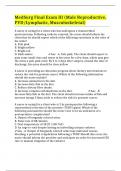
-
MedSurg Final Exam III (Male Reproductive, PVD/Lymphatic, Musculoskeletal)
- Exam (elaborations) • 8 pages • 2023
- Available in package deal
-
- $9.49
- + learn more
MedSurg Final Exam III (Male Reproductive, PVD/Lymphatic, Musculoskeletal)
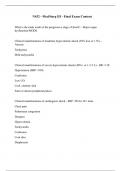
-
N432 - Med/Surg III - Final Exam Content
- Exam (elaborations) • 18 pages • 2024
-
- $10.00
- + learn more
What is the main result of the progressive stage of shock? - Major organ dysfunction/MODS Clinical manifestations of moderate hypovolemic shock (30% loss or 1.5L) - Anxiety Tachypnea Mild tachycardia Clinical manifestations of severe hypovolemic shock (40%+ or 1.5-2 L) - HR >110 Hypotension (SBP <100) Confusion Low UO Cool, clammy skin Faint or absent peripheral pulses Clinical manifestations of cardiogenic shock - SBP <90 for 30+ mins Chest pain Pulmonary congestion Dysp...
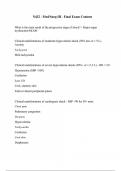
-
N432 - Med/Surg III - Final Exam Content
- Exam (elaborations) • 18 pages • 2024
-
- $11.00
- + learn more
What is the main result of the progressive stage of shock? - Major organ dysfunction/MODS Clinical manifestations of moderate hypovolemic shock (30% loss or 1.5L) - Anxiety Tachypnea Mild tachycardia Clinical manifestations of severe hypovolemic shock (40%+ or 1.5-2 L) - HR >110 Hypotension (SBP <100) Confusion Low UO Cool, clammy skin Faint or absent peripheral pulses Clinical manifestations of cardiogenic shock - SBP <90 for 30+ mins Chest pain Pulmonary congestion Dysp...
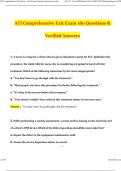
-
ATI Comprehensive Exit Exam 180 Correct Questions & Answers 2024 Graded A+ Complete Solutions Verified by Experts 100% Correct
- Exam (elaborations) • 96 pages • 2024
-
- $15.99
- + learn more
ATI Comprehensive Exit Exam 180 Correct Questions & Answers 2024 Graded A+ Complete Solutions Verified by Experts 100% Correct 1. A nurse is caring for a client who has given informed consent for ECT. Just before the procedure, the client tells the nurse she is considering not going forward with the treatment. Which of the following statements by the nurse is appropriate? a. “You don’t have to go through with the treatment.” b. “Most people who have this procedure feel better following t...
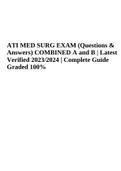
-
ATI MED SURG EXAM (Questions and Answers) COMBINED A and B | Latest Answers 2023 - Complete Guide Graded A+
- Exam (elaborations) • 71 pages • 2023
-
- $17.49
- + learn more
ATI MED SURG EXAM (Questions & Answers) COMBINED A and B | Latest Answers 2023 - Complete Guide Graded A+. A nurse in a provider’s office is caring for a client who requests sildenafil to treat erectile dysfunction. Which of the following statements should the nurse make? You will not be able to use sildenafil if you are taking nitro A nurse is planning care for a client who has extensive burn injuries and is immunocompromised. Which of the following precautions should the nurse include in...
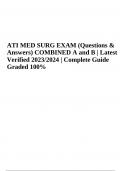
-
ATI MED SURG EXAM (Questions & Answers) COMBINED A and B, Verified 2023 Complete Guide Graded A+
- Exam (elaborations) • 71 pages • 2023
- Available in package deal
-
- $27.49
- + learn more
ATI MED SURG EXAM (Questions & Answers) COMBINED A and B, Verified 2023 Complete Guide Graded A+. An older adult client is brought to an emergency department by a family member. Which od the following assessment findings should cause the nurse to suspect that the client has hypertonic dehydration? Urine specific gravity 1.045 14. A nurse is caring for client who has a prescription for enalapril. The nurse should identify which of the adverse effect of the medication? Orthostatic hypotens...
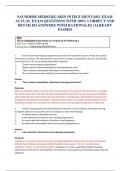
-
2019 REVISED 2023 SAUNDERS MEDSURG SKIN INTEGUMENTARY EXAM ACTUAL EXAM QUESTIONS WITH 100% CORRECT AND DETAILED ANSWERS WITH RATIONALES /ALREADY PASSED
- Exam (elaborations) • 36 pages • 2023
- Available in package deal
-
- $16.99
- + learn more
2019 REVISED 2023 SAUNDERS MEDSURG SKIN INTEGUMENTARY EXAM ACTUAL EXAM QUESTIONS WITH 100% CORRECT AND DETAILED ANSWERS WITH RATIONALES /ALREADY PASSED A client calls the emergency department and tells the nurse that he came directly into contact with poison ivy shrubs. The client tells the nurse that he cannot see anything on the skin and asks the nurse what to do. The nurse should make which response? 1. "Come to the emergency department." 2. "Apply calamine lotion immediately to the...
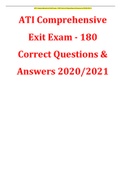
-
ATI Comprehensive Exit Exam - 180 Correct Questions & Answers 2021/2022
- Exam (elaborations) • 41 pages • 2022
-
- $16.49
- 1x sold
- + learn more
ATI Comprehensive Exit Exam - 180 Correct Questions & Answers 2020/2021 ATI Comprehensive Exit Exam - 180 Correct Questions & Answers 2020/2021 EXIT EXAM 1. A nurse is caring for a client who has given informed consent for ECT. Just before the procedure, the client tells the nurse she is considering not going forward with the treatment. Which of the following statements by the nurse is appropriate? a. “You don’t have to go through with the treatment.” b. “Most people who have this proced...
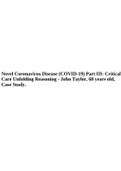
-
Novel Coronavirus Disease (COVID-19) Part III: Critical Care Unfolding Reasoning - John Taylor, 68 years old, Case Study.
- Case • 16 pages • 2023
- Available in package deal
-
- $14.49
- + learn more
Novel Coronavirus Disease (COVID-19) Part III: Critical Care Unfolding Reasoning - John Taylor, 68 years old, Case Study. Novel Coronavirus Disease (COVID-19) Part III: Critical Care Unfolding Reasoning John Taylor, 68 years old Primary Concept Immunity/Gas Exchange/Perfusion Interrelated Concepts (In order of emphasis) Clinical judgment Communication Acid-base balance Patient education NCLEX Client Need Categories Covered in Case Study NCSBN Clinical Jud...

How did he do that? By selling his study resources on Stuvia. Try it yourself! Discover all about earning on Stuvia


